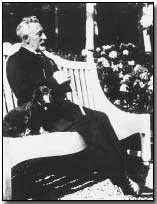Primary Documents - Kaiser Wilhelm II on his Decision to Seek Exile in Holland, 9 November 1918
 With Germany actively
seeking an armistice and revolution threatening, calls for
Kaiser
Wilhelm II to abdicate grew in intensity. Wilhelm was
himself deeply reluctant to make such a sacrifice, instead expressing a
preference to lead his armies back into Germany from the Western Front.
Upon being informed by his military advisers that the army could not be
relied upon not to harm him
Wilhelm abandoned the notion in a letter
to his son,
Crown Prince Wilhelm
(reproduced below).
With Germany actively
seeking an armistice and revolution threatening, calls for
Kaiser
Wilhelm II to abdicate grew in intensity. Wilhelm was
himself deeply reluctant to make such a sacrifice, instead expressing a
preference to lead his armies back into Germany from the Western Front.
Upon being informed by his military advisers that the army could not be
relied upon not to harm him
Wilhelm abandoned the notion in a letter
to his son,
Crown Prince Wilhelm
(reproduced below).
Wilhelm's abdication was announced by Chancellor Prince Max von Baden in a 9 November 1918 proclamation - before Wilhelm had in fact consented to abdicate (but after Social Democrat Philipp Scheidemann had announced the Kaiser's departure from the balcony of the Reichstag). Faced with a fait accompli Wilhelm formally abdicated and went into exile in Holland. His abdication proclamation was formally published in Berlin on 30 November 1918.
Faced with public criticism over the nature of Wilhelm's abdication German Army Chief of Staff Paul von Hindenburg issued a statement on 20 March 1919 explaining the sequence of events and defending the Kaiser's role.
In the wake of the Kaiser's abdication his eldest son - Crown Prince Wilhelm - expressed a desire on 11 November 1918 - the date of the armistice - to be allowed to lead his army back home to Germany. His wish was, given the anti-royalist fervour of the moment, rejected out of hand by the government. He too went into exile in Holland, despatching a letter to Hindenburg following his arrival in which he explained and justified his position.
Having instigated the Kaiser's abdication Prince Max resigned, handing power to incoming Chancellor Friedrich Ebert who, in statements issued on 10 November and 17 November, appealed for public calm and reassured the German public that the incoming government would be "a government of the people".
Letter from Kaiser Wilhelm II to Crown Prince Wilhelm, 9 November 1918
My Dear Boy:
After the Court Chamberlain had informed me that he could no longer guarantee my safety at Main Headquarters, and that the troops also were no longer trustworthy, I resolved after a severe mental struggle to leave the army, which has collapsed, and go to Holland.
I advise you to stick to your post until the conclusion of the armistice.
In Berlin two Governments, under the leadership of Ebert and Liebknecht, are fighting against each other.
I hope to see you again in happier times.
Your faithful and deeply
affected father,
WILHELM
Source: Source Records of the Great War, Vol. VI, ed. Charles F. Horne, National Alumni 1923
One in five of the Australians and New Zealanders who left their country to fight in the war never returned; 80,000 in total.
- Did you know?
